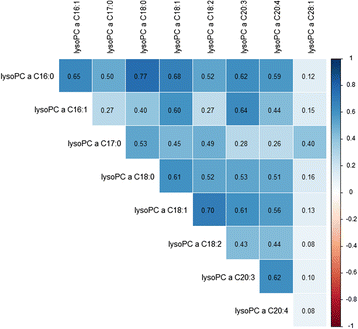Higher plasma levels of lysophosphatidylcholine 18:0 are related to a lower risk of common cancers in a prospective metabolomics study
- PMID: 26817443
- PMCID: PMC4730724
- DOI: 10.1186/s12916-016-0552-3
Higher plasma levels of lysophosphatidylcholine 18:0 are related to a lower risk of common cancers in a prospective metabolomics study
Abstract
Background: First metabolomics studies have indicated that metabolic fingerprints from accessible tissues might be useful to better understand the etiological links between metabolism and cancer. However, there is still a lack of prospective metabolomics studies on pre-diagnostic metabolic alterations and cancer risk.
Methods: Associations between pre-diagnostic levels of 120 circulating metabolites (acylcarnitines, amino acids, biogenic amines, phosphatidylcholines, sphingolipids, and hexoses) and the risks of breast, prostate, and colorectal cancer were evaluated by Cox regression analyses using data of a prospective case-cohort study including 835 incident cancer cases.
Results: The median follow-up duration was 8.3 years among non-cases and 6.5 years among incident cases of cancer. Higher levels of lysophosphatidylcholines (lysoPCs), and especially lysoPC a C18:0, were consistently related to lower risks of breast, prostate, and colorectal cancer, independent of background factors. In contrast, higher levels of phosphatidylcholine PC ae C30:0 were associated with increased cancer risk. There was no heterogeneity in the observed associations by lag time between blood draw and cancer diagnosis.
Conclusion: Changes in blood lipid composition precede the diagnosis of common malignancies by several years. Considering the consistency of the present results across three cancer types the observed alterations point to a global metabolic shift in phosphatidylcholine metabolism that may drive tumorigenesis.
Figures


Similar articles
-
Pre-diagnostic metabolite concentrations and prostate cancer risk in 1077 cases and 1077 matched controls in the European Prospective Investigation into Cancer and Nutrition.BMC Med. 2017 Jul 5;15(1):122. doi: 10.1186/s12916-017-0885-6. BMC Med. 2017. PMID: 28676103 Free PMC article.
-
Association between pre-diagnostic circulating lipid metabolites and colorectal cancer risk: a nested case-control study in the European Prospective Investigation into Cancer and Nutrition (EPIC).EBioMedicine. 2024 Mar;101:105024. doi: 10.1016/j.ebiom.2024.105024. Epub 2024 Feb 26. EBioMedicine. 2024. PMID: 38412638 Free PMC article.
-
Obesity-Related Metabolomic Profiles and Discrimination of Metabolically Unhealthy Obesity.J Proteome Res. 2018 Apr 6;17(4):1452-1462. doi: 10.1021/acs.jproteome.7b00802. Epub 2018 Mar 22. J Proteome Res. 2018. PMID: 29493238
-
Decreased expression of lysophosphatidylcholine (16:0/OH) in high resolution imaging mass spectrometry independently predicts biochemical recurrence after surgical treatment for prostate cancer.Prostate. 2015 Dec;75(16):1821-30. doi: 10.1002/pros.23088. Epub 2015 Sep 1. Prostate. 2015. PMID: 26332786 Review.
-
Metabolomic profiling of hormone-dependent cancers: a bird's eye view.Trends Endocrinol Metab. 2015 Sep;26(9):477-85. doi: 10.1016/j.tem.2015.07.001. Epub 2015 Aug 1. Trends Endocrinol Metab. 2015. PMID: 26242817 Free PMC article. Review.
Cited by
-
Changes in phospholipid metabolism in exosomes of hormone-sensitive and hormone-resistant prostate cancer cells.J Cancer. 2021 Mar 15;12(10):2893-2902. doi: 10.7150/jca.48906. eCollection 2021. J Cancer. 2021. PMID: 33854590 Free PMC article.
-
Serum Metabolite Profiles in Participants of Lung Cancer Screening Study; Comparison of Two Independent Cohorts.Cancers (Basel). 2021 May 31;13(11):2714. doi: 10.3390/cancers13112714. Cancers (Basel). 2021. PMID: 34072693 Free PMC article.
-
Untargeted serum metabolomic profiles and breast density in young women.Cancer Causes Control. 2024 Feb;35(2):323-334. doi: 10.1007/s10552-023-01793-w. Epub 2023 Sep 22. Cancer Causes Control. 2024. PMID: 37737303
-
Differences in metabolomic profiles between Black and White women in the U.S.: Analyses from two prospective cohorts.Eur J Epidemiol. 2024 Jun;39(6):653-665. doi: 10.1007/s10654-024-01111-x. Epub 2024 May 4. Eur J Epidemiol. 2024. PMID: 38703248
-
Interlaboratory comparison of standardised metabolomics and lipidomics analyses in human and rodent blood using the MxP® Quant 500 kit.bioRxiv [Preprint]. 2024 Nov 14:2024.11.13.619447. doi: 10.1101/2024.11.13.619447. bioRxiv. 2024. PMID: 39605511 Free PMC article. Preprint.
References
Publication types
MeSH terms
Substances
LinkOut - more resources
Full Text Sources
Other Literature Sources

